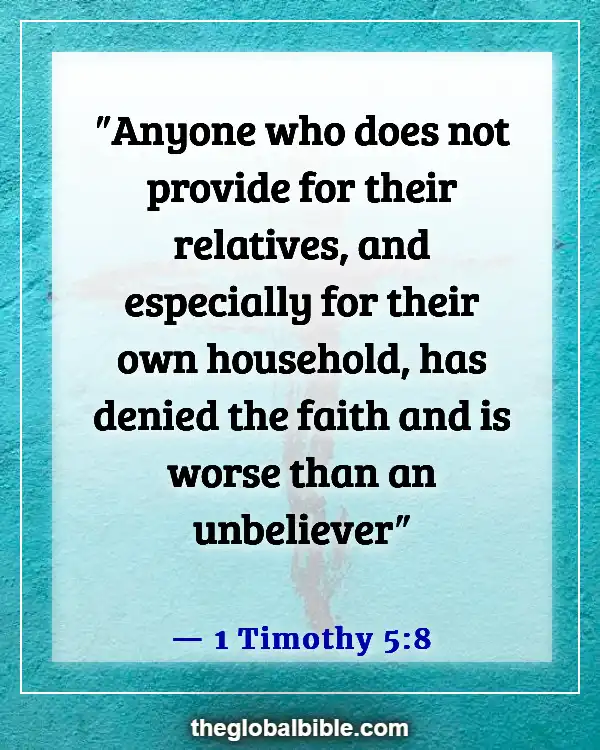Dear friends and fellow believers,
Today, we delve into the significant topic of caring for our parents, a principle deeply rooted in the teachings of the Bible. This message is not only a reminder for us but also something to share with others who might find encouragement and inspiration in it.
The Bible emphasizes the importance of honoring our parents, which is more than just following their rules when we are young. It involves a lifelong dedication to showing them love, respect, and care. Our parents, with their wisdom and life experiences, have shaped who we are today. By valuing and caring for them, we strengthen our family ties and create an atmosphere of love and respect that aligns with God’s desires.
As our parents grow older, they may require more support from us. The Bible encourages us to be present for them, providing both emotional comfort and practical assistance. This could involve listening to their stories, helping with household tasks, or ensuring they have the care and support they need. Our parents have made numerous sacrifices for our well-being, and now it’s our opportunity to express our gratitude and love.
Throughout the Bible, we find inspiring stories of individuals who cared for their elderly parents. These narratives remind us of the importance of family unity and supporting one another through life’s various phases. They illustrate the values of kindness, compassion, and loyalty—qualities that reflect the divine love God wishes to see in our families.
God assures us that honoring our parents brings blessings. These blessings often manifest as a fulfilling and harmonious life. By respecting our parents, we align ourselves with divine principles, fostering peace and contentment within our families and communities.
Balancing the care of our parents with our own family responsibilities can be a delicate task. The Bible provides guidance on managing both with grace and wisdom. Open communication, setting healthy boundaries, and seeking divine guidance through prayer are essential. This balance not only enhances our resourcefulness and patience but also nurtures a loving environment for both our parents and our immediate family.
Practical ways to support our parents include regular visits, phone calls, assisting with errands, and involving them in family gatherings. We should be attentive to their health and advocate for them as needed. These actions are tangible expressions of our love and fulfillment of our God-given responsibility to care for them.
Remember, dear brothers and sisters, caring for our parents is not merely an obligation but a privilege. It is an opportunity to demonstrate God’s love and honor those who have given us life. Let us all strive to embody these biblical teachings in our daily lives, bringing joy to our parents and glory to God.
May we continue to reflect on these teachings and implement them in our lives.
Contents
- 1 How can I show respect to my aging parents according to Scripture?
- 2 Biblical examples of caring for elderly parents
- 3 What are the promises associated with honoring parents in the Bible?
- 4 How to balance caring for parents and your own family responsibilities
- 5 Practical ways to apply biblical teachings on caring for parents
- 6 Conclusions
How can I show respect to my aging parents according to Scripture?
Showing respect to aging parents is a key theme in the Bible, encouraging us to be there for them in their later years. As they age, they may need more help, understanding, and patience from us. The Bible guides us to approach this with love, ensuring that our parents feel valued and respected. It’s important to acknowledge their wisdom and life experiences while also recognizing their unique needs as they grow older. Respecting our aging parents involves being present, listening, and offering assistance in day-to-day activities. It’s about maintaining their dignity and supporting them emotionally and physically. By doing so, we live out the teachings of the Bible, creating a nurturing environment that honors the sacrifices they made for us.
1 Timothy 5:4 – Support and care for parents

“But if any widow have children or nephews, let them learn first to shew piety at home, to requite their parents: for that is good acceptable before God”— 1 Timothy 5:4
1 Timothy 5:4 emphasizes the importance of caring for aging parents as a reflection of one’s faith and respect for family. It teaches that children and grandchildren should repay their parents by providing support and care, demonstrating godliness within their own households. This act of love and responsibility is not only pleasing to God but also honors the family unit. By taking care of our parents, we fulfill a divine duty, showing gratitude and respect for the sacrifices they made for us.
Leviticus 19:32 – Honor the elderly with respect

“Thou shalt rise up before the hoary head, honour the face of the old man, fear thy God: I am the Lord”— Leviticus 19:32
Leviticus 19:32 emphasizes the importance of respecting and honoring the elderly, which includes showing reverence to aging parents. This verse underscores the biblical principle of valuing wisdom and experience while demonstrating respect through actions and attitudes. It calls believers to rise in the presence of the aged and honor them, reflecting God’s commandment to love and care for one’s parents. By treating our elders with dignity, we honor God and uphold His teachings on family and community.
Proverbs 23:22 – Listen to your aging parents

“Hearken unto thy father that begat thee, despise not thy mother when she is old”— Proverbs 23:22
Proverbs 23:22 emphasizes the importance of honoring our parents, particularly as they age. The verse advises us to “listen to your father who gave you life, and do not despise your mother when she is old.” This highlights the value of respect and gratitude toward our parents, acknowledging their lifelong contributions and wisdom. By listening and being attentive to their needs, we fulfill a biblical duty to care for them, demonstrating love and respect as prescribed by Scripture.
1 Peter 5:5 – Humility and respect for elders

“Likewise, ye younger, submit yourselves unto the elder. Yea, all of you be subject one to another, be clothed with humility: for God resisteth the proud, giveth grace to the humble”— 1 Peter 5:5
1 Peter 5:5 encourages believers to clothe themselves with humility, particularly in their relationships with elders. This verse underscores the importance of showing respect and deference to those who are older, including our parents. In the context of caring for aging parents, this scripture reminds us to approach them with a humble heart, valuing their wisdom and experience. By doing so, we honor them and fulfill the biblical mandate to respect and care for our elders, demonstrating love and humility in action.
Colossians 3:20 – Obey your parents in everything

“Children, obey your parents in all things: for this is well pleasing unto the Lord”— Colossians 3:20
Colossians 3:20 emphasizes the importance of obedience and respect towards parents. In the context of caring for aging parents, this verse can be interpreted as a call to honor their wisdom and needs. By listening to and valuing their guidance, we demonstrate love and respect. Scripture encourages us to support our parents emotionally, physically, and spiritually, fulfilling our duty as children. Obedience in this sense extends to showing compassion and ensuring their well-being as they age.
Biblical examples of caring for elderly parents
The Bible provides numerous examples of individuals who cared for their elderly parents, illustrating the importance of this practice. These stories serve as powerful reminders of the love and dedication we should have towards our parents. Caring for them is not just a responsibility but an opportunity to express gratitude for all they have done for us. Through these examples, we learn the value of family unity and the significance of supporting each other through different stages of life. It’s about embodying kindness, compassion, and loyalty, qualities that strengthen familial bonds and reflect God’s love. These biblical narratives inspire us to prioritize our parents’ well-being, ensuring they feel loved and cared for in their later years.
Ruth 4:15 – A blessing for Naomi

“He shall be unto thee a restorer of thy life, a nourisher of thine old age: for thy daughter in law, which loveth thee, which is better to thee than seven sons, hath born him”— Ruth 4:15
Ruth 4:15 highlights the deep care and devotion shown to Naomi, an elderly widow, by her daughter-in-law, Ruth. The verse describes Ruth as better than seven sons, underscoring the profound blessing she is to Naomi. This exemplifies the biblical value of caring for one’s parents or elders. Ruth’s unwavering loyalty and love provide Naomi with hope and security, illustrating how familial devotion can transform lives and fulfill God’s promise of care and compassion in families.
Genesis 47:12 – Joseph provides for his family
“Joseph nourished his father, his brethren, all his father’s household, with bread, according to their families”— Genesis 47:12
Genesis 47:12 highlights Joseph’s dedication to his family, showcasing a powerful example of caring for elderly parents. After rising to a position of power in Egypt, Joseph ensures his family’s well-being during a severe famine. He provides them with food and sustenance, fulfilling his responsibility to support and honor his father, Jacob, and his household. This verse exemplifies the biblical principle of caring for one’s family, emphasizing the importance of providing for and respecting one’s parents in times of need.
1 Kings 2:19 – Solomon honors Bathsheba’s request
“Bathsheba therefore went unto king Solomon, to speak unto him for Adonijah. the king rose up to meet her, bowed himself unto her, sat down on his throne, caused a seat to be set for the king’s mother; she sat on his right hand”— 1 Kings 2:19
1 Kings 2:19 illustrates a powerful example of honoring and caring for one’s parents. In this verse, King Solomon demonstrates deep respect for his mother, Bathsheba, by rising to greet her, bowing, and providing a throne for her at his right hand. This act signifies not only reverence but also the importance of listening to and valuing the requests and wisdom of elderly parents. Solomon’s actions serve as a biblical model for honoring and caring for our parents with dignity and respect.
John 19:26-27 – Jesus cares for His mother
“When Jesus therefore saw his mother, the disciple standing by, whom he loved, he saith unto his mother, Woman, behold thy sonThen saith he to the disciple, Behold thy mother! from that hour that disciple took her unto his own home”— John 19:26-27
In John 19:26-27, even in His final moments on the cross, Jesus exemplifies the importance of caring for one’s parents. He entrusts His mother Mary to the beloved disciple John, ensuring she is cared for after His death. This act demonstrates the deep sense of duty and compassion that children should have towards their parents, especially as they age. Jesus’ gesture serves as a powerful biblical example of honoring and providing for one’s parents, emphasizing the enduring value of familial responsibility.
Luke 2:51 – Jesus obeyed His parents

“He went down with them, came to Nazareth, was subject unto them: but his mother kept all these sayings in her heart”— Luke 2:51
Luke 2:51 highlights Jesus’ obedience to His earthly parents, Mary and Joseph, by returning with them to Nazareth and submitting to their authority. This verse exemplifies the importance of honoring and respecting one’s parents, a principle deeply rooted in biblical teachings. By following His parents’ guidance, Jesus sets a profound example for us to care for and respect our parents, including in their later years, emphasizing the significance of family responsibility and love within a Christian context.
What are the promises associated with honoring parents in the Bible?
Honoring parents is associated with profound promises in the Bible, highlighting the blessings that flow from this practice. These promises often emphasize long life and prosperity, underscoring the importance of respecting our parents. By honoring them, we align ourselves with divine principles that foster harmony and peace within our families and communities. The act of honoring our parents is not just about following commandments; it’s about cultivating a spirit of love and reverence that enhances our lives. Embracing this teaching leads to personal growth and a deeper understanding of the interconnectedness within the family unit. Through these promises, we are reminded of the rewards that come from living a life grounded in respect and appreciation for our parents.
Exodus 20:12 – Long life and prosperity

“Honour thy father thy mother: that thy days may be long upon the land which the Lord thy God giveth thee”— Exodus 20:12
Exodus 20:12, part of the Ten Commandments, emphasizes the importance of honoring one’s parents. The verse promises that those who respect and care for their parents will be rewarded with long life and prosperity in the land God provides. This commandment highlights the value of familial relationships and underscores the idea that caring for parents is integral to a flourishing life. By honoring our parents, we align with God’s will, receiving His blessings of longevity and well-being.
Deuteronomy 5:16 – Long life and well-being

“Honour thy father thy mother, as the Lord thy God hath commanded thee; that thy days may be prolonged, that it may go well with thee, in the land which the Lord thy God giveth thee”— Deuteronomy 5:16
Deuteronomy 5:16 emphasizes the importance of honoring one’s parents as a fundamental commandment. This verse highlights the promise that those who respect and care for their parents will enjoy a long life and well-being in the land God provides. By valuing parental relationships, individuals align with divine principles, ensuring both personal blessings and societal stability. This commandment underscores the reciprocal nature of respect and care within families, fostering a nurturing environment that benefits both individuals and the broader community.
Proverbs 3:1-2 – Longevity and peace
“My son, forget not my law; but let thine heart keep my commandmentsFor length of days, long life, peace, shall they add to thee”— Proverbs 3:1-2
Proverbs 3:1-2 emphasizes the importance of adhering to parental guidance and God’s commandments, promising rewards of longevity and peace. In the context of honoring and caring for parents, the verse highlights that following wise teachings and showing respect leads to a fulfilling life, marked by stability and well-being. This aligns with the biblical promise that honoring one’s parents is not only a moral duty but also a pathway to receiving God’s blessings of a long and peaceful life.
Ephesians 6:3 – Live long, prosper on earth
“That it may be well with thee, thou mayest live long on the earth”— Ephesians 6:3
Ephesians 6:3 emphasizes the promise of well-being and longevity associated with honoring one’s parents. Rooted in the commandment to “honor your father and mother,” this verse highlights the tangible benefits of respect and care for parents, suggesting that such actions lead to a prosperous and enduring life on earth. By fulfilling this commandment, individuals align themselves with divine wisdom, fostering family harmony and receiving God’s favor, which manifests in a fruitful and sustained existence.
How to balance caring for parents and your own family responsibilities
Balancing the care for our parents with our own family responsibilities can be challenging, yet the Bible provides guidance on how to manage both with grace. It’s essential to prioritize and allocate time and resources effectively, ensuring that both our parents and our immediate families feel supported and loved. Communication and setting boundaries are crucial in maintaining this balance. By seeking wisdom and strength through prayer and reflection, we can navigate the complexities of caring for our parents while fulfilling our responsibilities to our own families. This balancing act teaches us to be resourceful, compassionate, and patient, fostering an environment where love and support thrive. It’s about creating a harmonious life where both our parents and our own family are valued and cared for.
1 Timothy 5:8 – Provide for family needs

“But if any provide not for his own, specially for those of his own house, he hath denied the faith, is worse than an infidel”— 1 Timothy 5:8
1 Timothy 5:8 emphasizes the importance of providing for one’s family, highlighting that neglecting this duty is contrary to faith. This verse underscores the necessity of balancing responsibilities towards both immediate family and parents. It calls believers to prioritize care for their household, including aging parents, as an expression of faith and love. By managing resources and time wisely, one can fulfill familial obligations, ensuring that no member lacks support, thus living out the values taught in Scripture.
Proverbs 22:6 – Train children in the right way

“Train up a child in the way he should go: when he is old, he will not depart from it”— Proverbs 22:6
Proverbs 22:6 emphasizes the importance of guiding children on the right path from an early age, ensuring they grow with strong values. In the context of balancing care for parents and family responsibilities, this verse highlights the need to instill responsibility and compassion in children. By teaching them to respect and care for their elders, we create a supportive family environment. This foundation allows individuals to manage the dual responsibilities of caring for aging parents while also nurturing their own families.
Colossians 3:21 – Encourage children, avoid discouragement

“Fathers, provoke not your children to anger, lest they be discouraged”— Colossians 3:21
Colossians 3:21 advises parents not to provoke their children, to prevent discouragement. This principle applies when balancing care for aging parents with family responsibilities. Just as parents should nurture without disheartening, adults can care for their parents while ensuring their own children feel supported. By fostering open communication and mutual respect, families can create a nurturing environment that honors both elder care and the well-being of their immediate family, maintaining harmony and emotional health for all.
Proverbs 31:27 – Diligence in household care

“She looketh well to the ways of her household, eateth not the bread of idleness”— Proverbs 31:27
Proverbs 31:27 emphasizes the importance of diligence and attentiveness in managing household responsibilities. This verse illustrates the virtue of being watchful and proactive in caring for one’s family. When balancing the care of aging parents with personal family duties, it encourages prioritizing tasks and maintaining a vigilant, organized approach. By embodying the diligence described in this verse, one can effectively support both their parents and their own family, ensuring that each receives the necessary attention and care.
Ephesians 5:28 – Love spouse as own body

“So ought men to love their wives as their own bodies. He that loveth his wife loveth himself”— Ephesians 5:28
Ephesians 5:28 emphasizes the importance of loving one’s spouse as one loves their own body, highlighting the deep care and unity in marriage. When balancing the care of parents with family responsibilities, this verse serves as a reminder to extend love, compassion, and selflessness in all relationships. Just as we nurture and prioritize our own well-being, we are called to support both our spouse and parents, ensuring that love guides our actions in maintaining harmony and fulfilling our responsibilities.
Practical ways to apply biblical teachings on caring for parents
Applying biblical teachings on caring for parents involves practical actions that reflect love and respect. This includes ensuring their physical needs are met, providing emotional support, and being present in their lives. Regular communication, acts of service, and quality time are ways to demonstrate care and appreciation. Additionally, advocating for their needs and being attentive to their health and well-being are vital. These actions not only honor our parents but also fulfill the biblical mandate to care for them. By integrating these practices into our daily lives, we create a supportive and nurturing environment that upholds the values taught in the Bible. It’s about translating the principles of love, respect, and compassion into tangible actions that enhance our relationships with our parents.
Proverbs 23:24-25 – Joy from righteous children

“The father of the righteous shall greatly rejoice: he that begetteth a wise child shall have joy of himThy father thy mother shall be glad, she that bare thee shall rejoice”— Proverbs 23:24-25
Proverbs 23:24-25 highlights the joy and fulfillment parents experience when their children live righteously and wisely. It underscores the importance of honoring and respecting one’s parents by making choices that reflect integrity and moral character. Practical ways to apply this teaching include showing gratitude, providing emotional support, and ensuring their well-being. By embodying these values, children not only bring happiness to their parents but also fulfill biblical teachings on caring for one’s family.
1 Corinthians 13:4-7 – Love is patient and kind

“Charity suffereth long, is kind; charity envieth not; charity vaunteth not itself, is not puffed upDoth not behave itself unseemly, seeketh not her own, is not easily provoked, thinketh no evilRejoiceth not in iniquity, but rejoiceth in the truthBeareth all things, believeth all things, hopeth all things, endureth all things”— 1 Corinthians 13:4-7
1 Corinthians 13:4-7 beautifully defines love as patient, kind, and selfless. When applied to caring for parents, these verses encourage us to show enduring patience and kindness, even when challenges arise. Love does not boast or insist on its own way, reminding us to prioritize our parents’ needs over our convenience. By embodying love that rejoices with truth and bears all things, we honor our parents, reflecting the biblical call to cherish and respect them through compassionate actions.
Galatians 6:9-10 – Do good to everyone
“Let us not be weary in well doing: for in due season we shall reap, if we faint notAs we have therefore opportunity, let us do good unto all men, especially unto them who are of the household of faith”— Galatians 6:9-10
Galatians 6:9-10 encourages believers to persist in doing good and not to grow weary, emphasizing the importance of helping others, especially within the community of faith. In the context of caring for parents, this verse reminds us to actively support and honor them, reflecting God’s love through our actions. Practical applications include spending quality time, providing financial support if needed, and ensuring their well-being, thereby fulfilling the biblical call to do good to everyone, starting with our own family.
Philippians 2:3-4 – Value others above yourselves

“Let nothing be done through strife or vainglory; but in lowliness of mind let each esteem other better than themselvesLook not every man on his own things, but every man also on the things of others”— Philippians 2:3-4
Philippians 2:3-4 encourages believers to embrace humility and prioritize the needs of others, which is crucial in caring for parents. By valuing others above ourselves, we can apply this teaching to honor and support our parents, ensuring their well-being and dignity. This selfless mindset fosters a loving environment where parents feel cherished and respected. Practical ways to live out this verse include listening to their needs, offering assistance, and making time for them, reflecting the love and humility Christ exemplifies.
James 1:27 – Pure religion: care for others

“Pure religion undefiled before God the Father is this, To visit the fatherless widows in their affliction, to keep himself unspotted from the world”— James 1:27
James 1:27 emphasizes the essence of pure religion as caring for the vulnerable, highlighting the importance of compassion and service. While the verse specifically mentions caring for orphans and widows, its principles can be applied to caring for parents. By honoring and supporting our parents, we embody the selfless love and duty God calls us to practice. This aligns with biblical teachings that prioritize love, respect, and responsibility within the family, reflecting true devotion and faith in action.
Romans 12:10 – Love and honor your parents

“Be kindly affectioned one to another with brotherly love; in honour preferring one another”— Romans 12:10
Romans 12:10 encourages us to “be devoted to one another in love” and to “honor one another above yourselves.” When applied to caring for parents, this verse highlights the importance of showing love and respect to those who raised us. Practically, this means actively listening to their needs, providing support, and spending quality time with them. By honoring our parents, we reflect the biblical principle of selfless love, demonstrating our commitment to family and the values of respect and care taught in Scripture.
Conclusions
In conclusion, the Bible provides clear guidance on the importance of honoring and caring for our parents. These teachings emphasize respect, practical support, and gratitude for those who raised us. By studying and applying these biblical principles, we gain a deeper understanding of God’s heart for family relationships and our responsibilities as adult children.
Incorporating these teachings into our lives requires intentionality and often sacrifice. We must balance our various duties while prioritizing the care of our aging parents. This may involve adjusting our schedules, finances, or living arrangements to ensure their well-being.
Ultimately, caring for our parents is not just about fulfilling an obligation but about reflecting God’s love and compassion. It’s an opportunity to demonstrate Christ-like service and to honor the Lord by respecting those He placed as authorities in our lives. As we strive to obey God’s Word in this area, we can trust that He will provide the wisdom, strength, and resources needed to care for our parents effectively.
By embracing these biblical principles, we not only bless our parents but also set a powerful example for future generations, creating a legacy of love, respect, and familial devotion that aligns with God’s design for families.

More Bible Topics